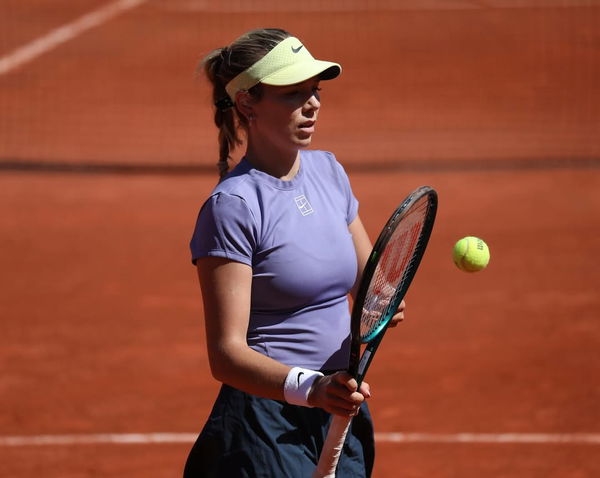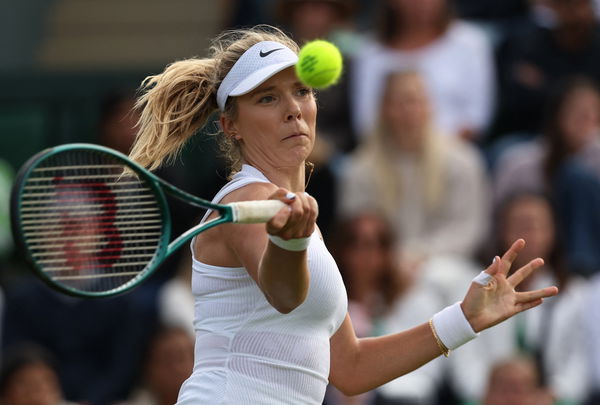
Imago
Credit: Instagram / @katiecboulter

Imago
Credit: Instagram / @katiecboulter
Two weeks ago, world No. 3 Jessica Pegula posted a series of screenshots to her Instagram Stories. The messages were vile, cruel, and filled with hate. They came flooding in after her shock loss to world No. 361 Lois Boisson at Roland Garros. Pegula had no doubts about who was responsible—she blamed “insane and delusional” sports bettors for the wave of abuse. And she’s not alone. Now, Great Britain’s Katie Boulter is adding her voice to the growing concern.
Watch What’s Trending Now!
More players are starting to speak out about this disturbing trend. Pegula pointed out that simply staying off social media isn’t a real option for most top athletes anymore. Sponsorships and marketing deals rely heavily on online engagement. Just this week, both the WTA and ITF released findings from tennis’s first season-wide social media abuse report. According to the data, 40 percent of all targeted abuse toward players came from “angry gamblers.” That’s nearly half of all the hate directed at tennis professionals, linked directly to betting rage.
Katie Boulter recently opened up about her own experience, revealing just how toxic things can get. After losing in the second round at Roland Garros, Boulter showed the BBC a disturbing collection of messages. They were filled with violent threats and vulgar language. She believes a lot of the abuse comes from people who’ve bet on her matches as she receives them regardless of whether she wins or loses.

Reuters
Tennis – Wimbledon – All England Lawn Tennis and Croquet Club, London, Britain – July 2, 2024 Britain’s Katie Boulter in action during her first round match against Germany’s Tatjana Maria REUTERS/Paul Childs
When she beat Carole Monnet in her first-round match in Paris on 29 May, the abuse continued to poured in. One person messaged, “Hope you get cancer.” Another went even scarier, writing: “Candles and a coffin for your entire family.” They even referenced her grandmother’s grave with disturbing language. A third said, “Go to hell, I lost money my mother sent me.”
It’s enough to make anyone think twice about logging in. Boulter says there are two reasons she decided to share the messages. First, because this kind of behavior is now “the norm.” Second, because she’s worried about what this could do to younger players. She explained, “I think it just kind of shows how vulnerable we are. You really don’t know if this person is on site. You really don’t know if they’re nearby or if they know where you live or anything like that.”
“I just wonder who the person is that has sent that,” she said. “I don’t think it’s something that I would ever say to my worst enemy. It’s just an awful, awful thing to say to anyone. It’s horrible.”
That fear is now being backed by cold, hard data. The WTA and ITF worked with Signify Group’s Threat Matrix service to compile the report. The service launched in January 2024 and analyzed 1.6 million posts and comments across 40 languages. Using both AI and human analysts, they found nearly 8,000 abusive or violent messages from 4,200 accounts.
These aren’t just random trolls. Some of these threats are spilling over into real life.
Katie Boulter’s revelation exposes the real-life consequences of hate
High-profile players like Emma Raducanu and Iga Swiatek have experienced the spillover firsthand. Raducanu had already given a five-year restraining order in 2022 against a stalker who came to her house three times. But in 2025, things escalated again. In February, a man was removed from the WTA Dubai Championships after following the 22-year-old to four straight tournaments. He even approached her in public and was later spotted in the stands during one of her matches. She was visibly shaken.
The same man tried to get into Wimbledon this year. But thanks to tighter security, his name was flagged by the All England Club and he was blocked. British media confirmed he had signed a pledge to stay away from Raducanu, but clearly, he didn’t stick to it.
Then there’s Iga Swiatek’s case, which made headlines back in March. During a practice session at the Miami Open, she was verbally attacked by an “aggressive and taunting” fan. That man had previously sent abusive messages online. This time, he showed up in person and hurled insults about her and her family. Her team said it was “a direct transition from verbal aggression online to harassment in the real world.”
Now, Katie Boulter is preparing for more of the same as Wimbledon approaches. She knows the spotlight at her home Grand Slam will come with more eyeballs and, likely, more abuse. But by speaking up now, Boulter hopes to draw attention to the serious and very real risks players face beyond the court.
The online world isn’t just noise; it has real consequences. What more will it take for the system to protect athletes from this kind of abuse?

